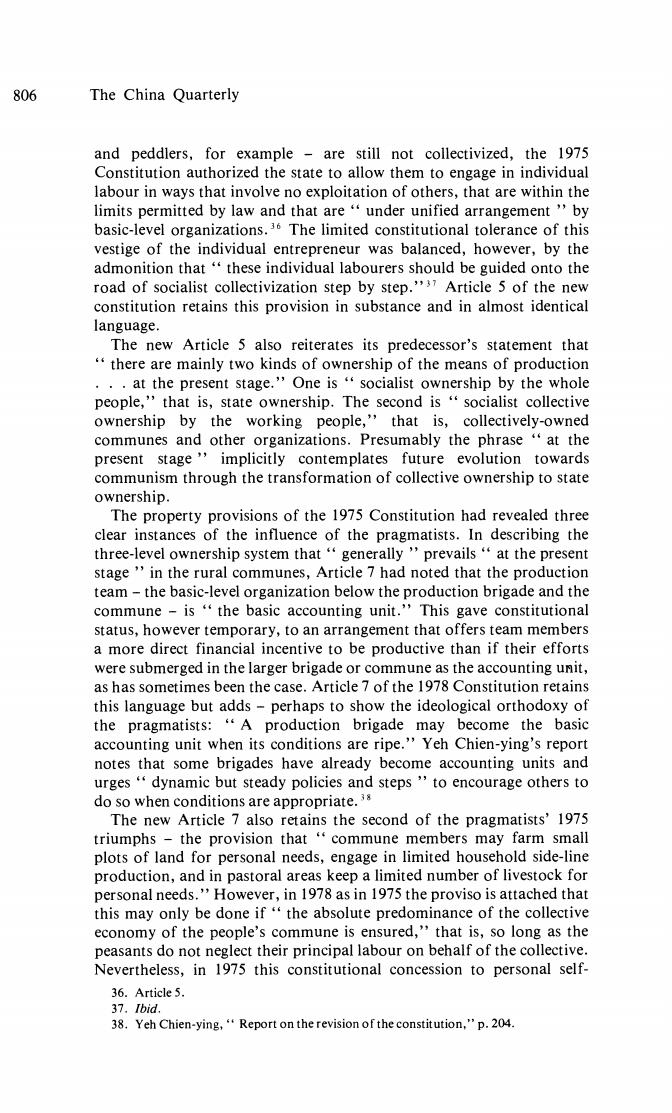正在加载图片...

806 The China Quarterly and peddlers,for example -are still not collectivized,the 1975 Constitution authorized the state to allow them to engage in individual labour in ways that involve no exploitation of others,that are within the limits permitted by law and that are"under unified arrangement"'by basic-level organizations.36 The limited constitutional tolerance of this vestige of the individual entrepreneur was balanced,however,by the admonition that "these individual labourers should be guided onto the road of socialist collectivization step by step."Article 5 of the new constitution retains this provision in substance and in almost identical language. The new Article 5 also reiterates its predecessor's statement that "there are mainly two kinds of ownership of the means of production ..at the present stage.''One is "socialist ownership by the whole people,''that is,state ownership.The second is "socialist collective ownership by the working people,"that is,collectively-owned communes and other organizations.Presumably the phrase "at the present stage''implicitly contemplates future evolution towards communism through the transformation of collective ownership to state ownership. The property provisions of the 1975 Constitution had revealed three clear instances of the influence of the pragmatists.In describing the three-level ownership system that"generally "prevails"at the present stage"'in the rural communes,Article 7 had noted that the production team-the basic-level organization below the production brigade and the commune-is "the basic accounting unit.''This gave constitutional status,however temporary,to an arrangement that offers team members a more direct financial incentive to be productive than if their efforts were submerged in the larger brigade or commune as the accounting unit, as has sometimes been the case.Article 7 of the 1978 Constitution retains this language but adds-perhaps to show the ideological orthodoxy of the pragmatists:"A production brigade may become the basic accounting unit when its conditions are ripe."Yeh Chien-ying's report notes that some brigades have already become accounting units and urgesdynamic but steady policies and steps'to encourage others to do so when conditions are appropriate.3s The new Article 7 also retains the second of the pragmatists'1975 triumphs-the provision that "commune members may farm small plots of land for personal needs,engage in limited household side-line production,and in pastoral areas keep a limited number of livestock for personal needs.''However,in 1978 as in 1975 the proviso is attached that this may only be done if"the absolute predominance of the collective economy of the people's commune is ensured,"that is,so long as the peasants do not neglect their principal labour on behalf of the collective. Nevertheless,in 1975 this constitutional concession to personal self- 36.Article 5 37.Ibid. 38.Yeh Chien-ying,Report on the revision of the constitution,"p.204.806 The China Quarterly and peddlers, for example - are still not collectivized, the 1975 Constitution authorized the state to allow them to engage in individual labour in ways that involve no exploitation of others, that are within the limits permitted by law and that are " under unified arrangement " by basic-level organizations.36 The limited constitutional tolerance of this vestige of the individual entrepreneur was balanced, however, by the admonition that " these individual labourers should be guided onto the road of socialist collectivization step by step."37 Article 5 of the new constitution retains this provision in substance and in almost identical language. The new Article 5 also reiterates its predecessor's statement that " there are mainly two kinds of ownership of the means of production . . . at the present stage." One is " socialist ownership by the whole people," that is, state ownership. The second is " socialist collective ownership by the working people, " that is, collectively-owned communes and other organizations. Presumably the phrase " at the present stage " implicitly contemplates future evolution towards communism through the transformation of collective ownership to state ownership. The property provisions of the 1975 Constitution had revealed three clear instances of the influence of the pragmatists. In describing the three-level ownership system that " generally " prevails " at the present stage " in the rural communes, Article 7 had noted that the production team - the basic-level organization below the production brigade and the commune - is " the basic accounting unit." This gave constitutional status, however temporary, to an arrangement that offers team members a more direct financial incentive to be productive than if their efforts were submerged in the larger brigade or commune as the accounting utwit, as has sometimes been the case. Article 7 of the 1978 Constitution retains this language but adds - perhaps to show the ideological orthodoxy of the pragmatists: " A production brigade may become the basic accounting unit when its conditions are ripe." Yeh Chien-ying's report notes that some brigades have already become accounting units and urges " dynamic but steady policies and steps " to encourage others to do so when conditions are appropriate. 3 8 The new Article 7 also retains the second of the pragmatists' 1975 triumphs - the provision that " commune members may farm small plots of land for personal needs, engage in limited household side-line production, and in pastoral areas keep a limited number of livestock for personal needs." However, in 1978 as in 1975 the proviso is attached that this may only be done if " the absolute predominance of the collective economy of the people's commune is ensured," that is, so long as the peasants do not neglect their principalabour on behalf of the collective. Nevertheless, in 1975 this constitutional concession to personal self- 36. Article 5. 37. Ibid. 38. Yeh Chien-ying, " Report on the revision of the constitution," p. 204